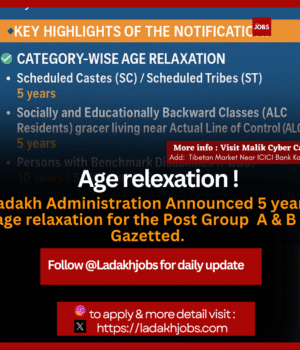In a significant move aimed at enhancing employment opportunities for residents of Ladakh, the Administration of the Union Territory of Ladakh has officially notified age relaxation provisions for direct recruitment to Group ‘A’ and Group ‘B’ Gazetted posts. This decision, published through Order No. 280-LA(GAD) of 2025, is expected to provide relief to aspirants who have faced limitations in applying for government jobs since the formation of the UT in 2019.
🔹 Key Highlights of the Notification:
✅ Category-Wise Age Relaxation
- Scheduled Castes (SC) / Scheduled Tribes (ST):
Upper age relaxation of 5 years. - Socially and Educationally Backward Classes (ALC Residents):
5 years of relaxation granted, acknowledging the difficulties faced by residents living near the Actual Line of Control (ALC). - Persons with Benchmark Disabilities (PwBD):
- 10 years for General Category
- 15 years for SC/ST and ALC categories
- Age capped at 56 years on the crucial date.
Each category must furnish valid domicile and category-specific certificates as per Ladakh Civil Services Decentralization and Recruitment Rules, 2025.
🔸 Special One-Time Age Relaxation (2025-2026)
In light of recruitment being delayed since UT formation, an additional 5-year relaxation is granted to all candidates, including Unreserved (UR) and reserved categories, for recruitment years 2025 and 2026. This is a one-time concession, ensuring that even those who exceed regular age limits due to past delays can now apply—provided they do not cross the maximum cap of 56 years.
🧾 Background:
Since Ladakh’s transition into a Union Territory on 31st October 2019, no direct recruitment for Group A and B gazetted posts could take place due to the absence of a legal recruitment framework. This notification aims to compensate for missed opportunities and ensure inclusive access to government jobs.
📣 What This Means for Aspirants:
This proactive move opens the door for many Ladakhi youth who had previously aged out due to delays in setting up recruitment systems. With additional relaxations and recognition of ALC residents as a disadvantaged category, the administration is making a strong effort toward inclusive governance and equitable development.











10+12
Jullay
Good
Karkit budgam